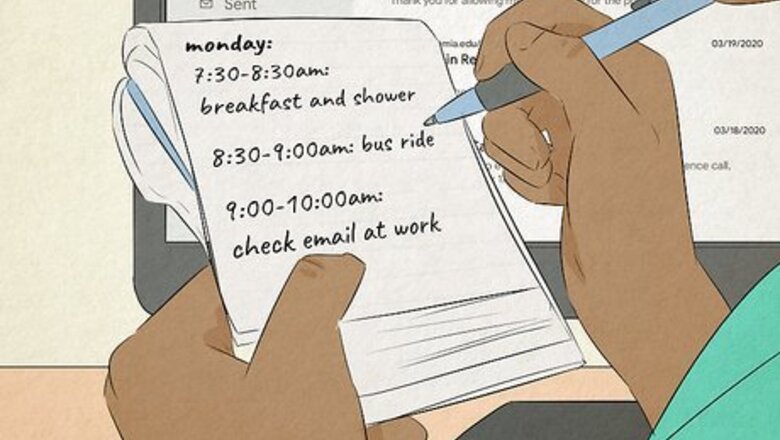
views
Track your time for at least a week.
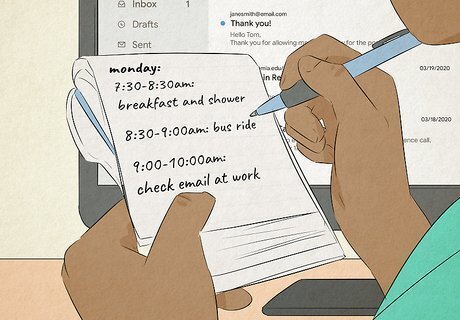
Keep a log of how you spend every waking moment so you know where your time is going. Get a small notebook you can carry around with you or use your smartphone as a log. Write down times and what you do during that time. After a week or so, go back and look through your log to get a better picture of how you spend your day. Don't cheat! If you're not honest about how you spend your time, you won't be able to improve anything. If you spent 20 minutes playing a game on your phone, write it down. If you want a more visual depiction, you can translate your log into pie charts or graphs to get a better idea of what tasks take up the most of your time.
Identify and eliminate bad habits.
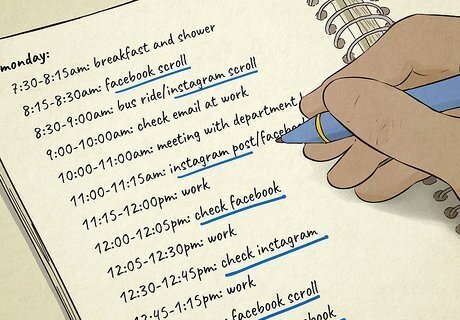
Look for things in your time log that are taking you off-task. You might have habits you've developed over time that are now doing you more harm than good. Maybe you check your phone every few minutes or respond to text messages immediately after receiving them. Changing your habits takes time and effort, but will help you manage your time more effectively so you have more time to do the things you enjoy and find fulfilling. For example, if you find that you're frequently derailed by social media notifications, turning those notifications off will help you stay on task better. Then, you can block specific times to check your social media accounts. If your problem is constantly checking your phone, try putting your phone in a drawer or another room while you're working on something important.
Organize your workspace to eliminate time-sinks.
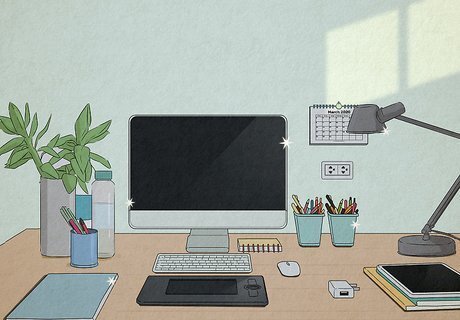
Remove clutter from your workspace and put everything you need in reach. If your workspace is disorganized, you'll lose time trying to find things that you need. Keep necessary items close-at-hand in a designated spot so you can always find them when you need them. This principle doesn't just apply to your desk at work—you can put it to good use at home as well. For example, organize your kitchen so that the utensils you use most frequently are nearest to where you use them.
Make a list of goals you want to achieve.
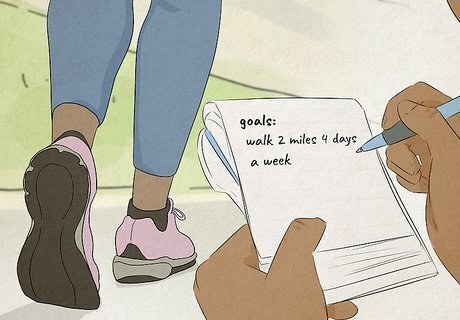
Start with 3-5 goals that you can achieve within a few weeks. Your goals might be work- or school-related, personal, or a mixture. Think of things that you want to change or improve upon and figure out what you need to do to get to where you want to be. Prioritize your goals so the most important one is first—that's the one you'll spend the most quality time on. Use the "SMART" method to set goals that are Specific, Measurable, Attainable, Relevant, and Timely. For example, you might set a goal to walk 2 miles 4 days a week. If you're already in the habit of walking regularly, this goal is certainly attainable. It's also specific and measurable. Once you've accomplished a few goals, use that sense of achievement to motivate yourself to press further. You can move on to more complex, long-term goals. Just remember to break them down into smaller pieces so they're attainable and you're always making progress.
Use a calendar and schedule to plan.
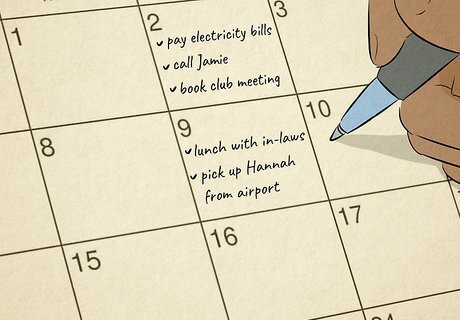
Mark events on a calendar and schedule daily tasks. Calendars help with long-term planning and specific events that take place at a certain date and time. Use a separate schedule for your daily tasks. Usually, your daily schedule will be fairly repetitive from day-to-day. Schedule time in half-hour and hour blocks. Group similar tasks together so your brain isn't switching gears as often. For example, you might schedule a half-hour block in the morning and in the afternoon to read and respond to emails. If someone asks you to do something and you're booked, don't be afraid to say "no." Trying to fit too many tasks into a day is a big reason people get stressed out.
Categorize tasks based on their urgency and importance.
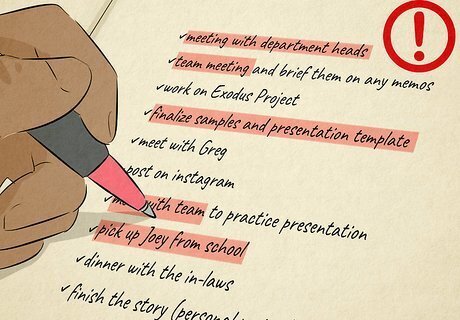
Do tasks that are both urgent and important first. Urgency relates to the time you have to complete the task, while importance relates to a task's necessity. If a task is urgent but not important, complete it after the tasks that are both urgent and important. Then, move on to tasks that are important but not urgent. Leave tasks that are neither urgent nor important for last. If possible, you can also delegate these tasks to others to complete. Since they're neither urgent nor important for you, it doesn't matter if the other person doesn't do as well with the task as you would have or takes longer than you would to get it done.
Do important tasks when you have the most energy.

Track your energy during the day to figure out when it's at its peak. If you're a morning person, you likely have the most energy soon after you get up, then flag later on in the afternoon. Night people, on the other hand, might find that they get a burst of energy later in the evening. If you have a deadline coming up soon, you might not be able to move around tasks like this. However, if you plan better for deadlines in the future, you can schedule that work for times when you have the most energy.
Delegate tasks you don't need to do yourself.
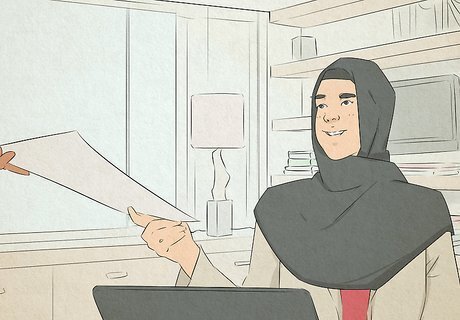
If a task is neither urgent nor important it can probably be done by someone else. If you have the ability to delegate tasks to other people, particularly in the work environment, it can help free up some of your time and take some of the pressure off of you. Keep in mind that delegation doesn't just mean assigning a task to another person—you can also use your computer and apps to automate some of your tasks. For example, if you find that you usually reply the same way to specific types of emails, you can automate a response so that you can respond with a single click rather than having to type it out every time. Avoid thinking that you have to do everything yourself or it won't be done correctly. Give others a chance to help you, particularly with things that aren't that important or difficult. It'll free up some of your time so you can get more things done that are truly important to you.
Block out time for family and friends.

Prioritize spending quality time with people you love. Time with your family and friends can be fulfilling and calming. Give your loved ones the gift of your attention by being present in the moments you share with them, rather than your mind being elsewhere. Find and schedule specific things to do so that you're not all just sitting in the same room on your phones. For example, you might have a family dinner on an evening when everyone is going to be home at around the same time. You could also schedule a family game night and choose board games that the whole family can enjoy. Some things you do every day are even better with friends! For example, if you run most mornings for exercise, get a friend to run with you once or twice a week.
Keep your focus in the moment.
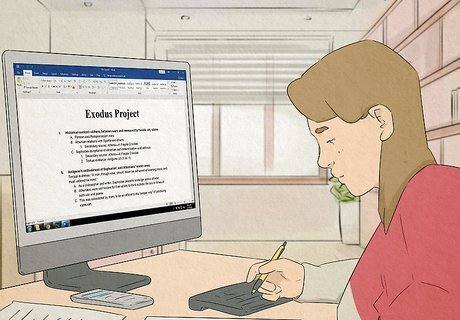
Focus on the task at hand rather than letting your mind drift elsewhere. Staying in the moment rather than doing something automatically while you think about something else is part of using your time wisely. You'll get things done more efficiently and get more enjoyment out of them if you commit to them 100% when you're doing them. This applies to time spent with family or friends as well. When you're eating dinner with the family, put your phone away and avoid checking your email or texting others. You'll get a lot more out of the time if you actively participate and remain present in the moment.
Take frequent breaks to keep your mind fresh.

If possible, take a 15-20 minute break every hour. You can only focus and concentrate for so long on a specific task. Taking frequent breaks keeps you working at peak performance and ensures you don't burn out. Over time, you might find that you feel less tired at the end of the day. If your work or school environment doesn't allow you to take breaks this long, you should still make an effort to take some kind of break every hour or so—even if it simply means switching tasks and doing something that doesn't take a lot of mental effort to give your brain a moment to recharge. For example, if you only have 10 minutes between 2 hour-long classes, you could step outside for a couple of minutes and walk around the building to help refresh your mind.



















Comments
0 comment